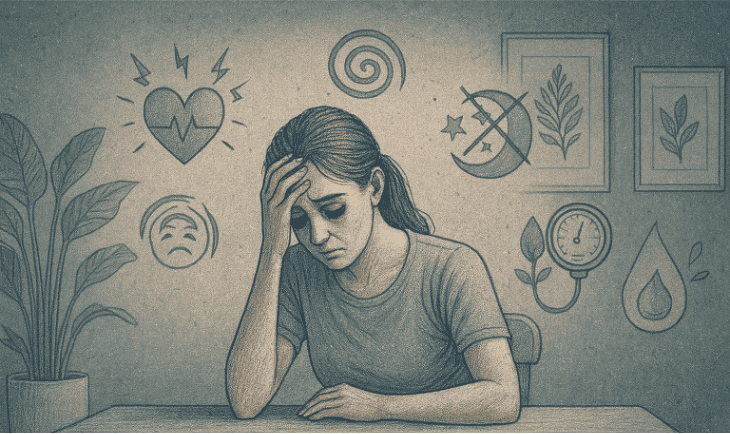Key Takeaways
- While chronic insomnia itself doesn’t directly cause death, it significantly increases the risk of serious health conditions that can be life-threatening, including heart disease, stroke, and metabolic disorders.
- Chronic insomnia with short sleep duration poses the greatest health risks, affecting cardiovascular health, blood pressure regulation, immune function, and mental well-being.
- Persistent insomnia disrupts critical bodily processes that occur during sleep, including blood pressure regulation, hormone balance, and cellular repair, leading to long-term health consequences.
- A Mission For Michael (AMFM) offers comprehensive mental health treatment programs that address insomnia and related conditions through evidence-based therapies, helping individuals restore healthy sleep patterns and reduce associated health risks.
Understanding the Real Risks of Chronic Insomnia
What Chronic Insomnia Really Means
Chronic insomnia goes beyond occasional sleepless nights. It’s diagnosed when you experience difficulty falling asleep, staying asleep, or getting quality rest at least three nights per week for three months or longer. This persistent pattern distinguishes chronic insomnia from short-term sleep troubles caused by stress or temporary life changes.
The condition affects your ability to function during the day, leaving you exhausted, mentally foggy, and struggling to meet daily demands. Unlike temporary insomnia, chronic insomnia requires intervention because it doesn’t typically resolve on its own.
The Direct Answer: Can Insomnia Be Fatal?
Here’s the straightforward answer: chronic insomnia itself doesn’t directly cause death. However, persistent sleep problems significantly increase your risk of developing serious, potentially life-threatening health conditions. The relationship between insomnia and mortality is indirect but real; chronic insomnia contributes to cardiovascular disease, metabolic disorders, and other conditions that can shorten lifespan.
The most concerning research shows that chronic insomnia combined with consistently short sleep duration carries the highest health risks. When your body regularly gets insufficient sleep night after night, the accumulated effects strain multiple biological systems.
Founded in 2010, A Mission For Michael (AMFM) offers specialized mental health care across California, Minnesota, and Virginia. Our accredited facilities provide residential and outpatient programs, utilizing evidence-based therapies such as CBT, DBT, and EMDR.
Our dedicated team of licensed professionals ensures every client receives the best care possible, supported by accreditation from The Joint Commission. We are committed to safety and personalized treatment plans.
How Chronic Insomnia Affects Your Physical Health

Chronic insomnia increases the risk of serious health conditions, including cardiovascular disease, diabetes, and mental health disorders.
Cardiovascular Health and Heart Disease Risk
Your heart and blood vessels rely on sleep to function optimally. Research consistently demonstrates that chronic insomnia increases cardiovascular disease risk through multiple pathways. The stress hormones that remain elevated when you can’t sleep properly affect your heart’s functioning and blood vessel health.
People with chronic insomnia face heightened risks for heart attacks and other cardiac events. The connection appears particularly strong when insomnia involves consistently getting less than 6 hours of sleep. Your cardiovascular system needs those deep sleep stages to recover and regulate itself properly.
Blood Pressure and Hypertension
During normal, healthy sleep, your blood pressure naturally decreases. This “nocturnal dipping” gives your cardiovascular system a break and helps maintain overall blood pressure regulation. When insomnia prevents adequate sleep, this protective dip doesn’t occur as it should.
Chronic insomnia is linked to the development of hypertension and makes existing high blood pressure harder to control. Without that nightly blood pressure reduction, your heart and blood vessels remain under strain for longer periods, increasing wear and tear on your cardiovascular system.
Diabetes and Metabolic Health
Sleep plays a crucial role in how your body processes glucose and regulates metabolism. Chronic insomnia disrupts these processes, increasing the risk of developing type 2 diabetes. The hormones that control hunger and blood sugar regulation become imbalanced when sleep is consistently inadequate.
The combination of insomnia and diabetes creates particularly serious health concerns. When both conditions exist together, the risks for cardiovascular complications increase substantially beyond what either condition presents alone.
Overall Health Consequences
Chronic insomnia weakens your body’s overall resilience. Your immune system relies on sleep to function effectively, making you more vulnerable to illness when insomnia persists. Inflammation levels increase, cognitive function declines, and your body’s ability to repair cellular damage diminishes.
The exhaustion from chronic insomnia also makes it harder to maintain healthy behaviors. Exercise feels impossible, making nutritious food choices requires energy you don’t have, and managing stress becomes overwhelming, all factors that compound health risks.
The Connection Between Insomnia and Serious Health Conditions
Heart Attack and Stroke Risk
Research shows clear associations between chronic insomnia and increased risk for both heart attacks and strokes. The mechanisms involve multiple factors: elevated stress hormones, increased inflammation, disrupted blood pressure regulation, and changes in how blood vessels function.
Certain insomnia symptoms appear particularly concerning. Difficulty falling asleep and non-restorative sleep, when you sleep but don’t feel rested, show the strongest links to cardiovascular mortality. These symptoms may indicate the most severe forms of sleep disruption.
Immune System Function
Your immune system performs critical maintenance and strengthening during sleep. Chronic insomnia compromises immune function, making you more susceptible to infections and possibly affecting your body’s ability to fight serious diseases. Sleep deprivation alters immune cell function and reduces your body’s inflammatory response regulation.
This weakened immunity creates vulnerability at a time when your body already faces increased stress from other insomnia-related health effects.
Mental Health and Quality of Life
While we’re focusing on physical health risks, it’s important to recognize that chronic insomnia profoundly affects mental health. Depression and anxiety commonly co-occur with insomnia, and this combination increases overall health risks. Mental health struggles make it harder to engage in health-promoting behaviors and can affect decision-making around medical care.
The exhaustion, frustration, and hopelessness that often accompany chronic insomnia diminish quality of life even before serious physical conditions develop.

Persistent insomnia affects cardiovascular health, immune function, and metabolic processes, creating serious long-term health risks.
Why Short Sleep Duration Matters
The Difference Between Insomnia and Sleep Deprivation
Some people with insomnia spend hours in bed unable to sleep, while others fall asleep but wake frequently or too early. The total amount of actual sleep you get matters significantly for health risk. Chronic insomnia with consistently short sleep duration, typically defined as less than 6 hours, appears to pose the greatest dangers.
This distinction helps explain why some studies show mixed results about insomnia and mortality. The most severe health consequences occur when insomnia results in sustained sleep deprivation, not just difficulty with the sleep process.
When Insomnia Becomes Most Dangerous
Persistent insomnia—when symptoms continue for years rather than coming and going—carries higher health risks than intermittent sleep problems. The accumulated effects of long-term sleep disruption create lasting changes in how your body functions.
The combination of chronic insomnia, short sleep duration, and existing health conditions creates the highest risk scenario. If you have diabetes or hypertension along with chronic insomnia, addressing your sleep becomes even more critical for protecting your long-term health.
Why Choose AMFM for Mental Health Treatment

AMFM provides comprehensive treatment for insomnia and related mental health conditions in supportive, healing environments.
A Mission For Michael (AMFM) recognizes that chronic insomnia often connects with anxiety, depression, trauma, and other mental health challenges. That’s why our programs treat sleep issues and emotional well-being together, helping you restore natural rest while addressing deeper causes.
Our residential programs provide 24-hour support in calm, therapeutic spaces designed for healing. Here, you’ll work closely with experienced clinicians who specialize in the link between sleep and mental health. Using evidence-based methods like cognitive behavioral therapy for insomnia, mindfulness, and targeted treatments for co-occurring conditions, we help you rebuild healthy sleep habits and regain balance.
We take a holistic approach that looks beyond surface symptoms. You’ll learn to understand your sleep patterns, pinpoint contributing factors, and establish effective sleep hygiene routines. At the same time, therapy targets emotional or psychological issues that may be disrupting your rest, creating lasting change.
For those who need structure but want some flexibility, our partial hospitalization programs combine daytime therapy with evenings at home. This setup allows you to apply new sleep strategies in your own environment while still benefiting from intensive daily support.
Outpatient programs are ideal for individuals ready to continue progress while maintaining work or family commitments. Ongoing therapy, skill reinforcement, and consistent clinical guidance help you sustain improvements and prevent relapse.
Family support plays a big role in recovery. Our education programs teach loved ones how to support your healing and create home environments that encourage better sleep for everyone.
With locations in California, Virginia, Minnesota, and Washington state, AMFM offers compassionate, evidence-based care in peaceful settings built for rest and recovery. We partner with most major insurance providers and simplify the admissions process through insurance verification and personalized treatment planning.
Frequently Asked Questions (FAQ)
Is it possible to die from lack of sleep?
While you won’t die directly from insomnia, chronic sleep deprivation significantly increases your risk of life-threatening conditions like heart disease, stroke, and diabetes. The accumulated health effects of persistent insomnia over months and years create serious dangers. Seeking treatment protects your long-term health and reduces these risks.
How many hours of sleep do I need to avoid health risks?
Most adults need 7 to 9 hours of quality sleep per night for optimal health. Research suggests that consistently sleeping less than 6 hours increases health risks significantly, particularly when combined with chronic insomnia. However, individual needs vary, and sleep quality matters as much as quantity.
When should I seek professional help for insomnia?
If sleep difficulties persist for more than a few weeks, interfere with your daily functioning, or cause significant distress, professional help is warranted. Don’t wait for insomnia to become chronic before seeking treatment. Early intervention is more effective and prevents the accumulated health risks of long-term sleep problems.
How does AMFM treat insomnia and related health concerns?
AMFM combines evidence-based treatments specifically effective for insomnia, including cognitive behavioral therapy for insomnia and comprehensive mental health care, with support for overall well-being. Our experienced clinical teams address both sleep problems and any co-occurring mental health conditions, helping you develop practical skills, restore healthy sleep patterns, and reduce long-term health risks in supportive, healing environments.







